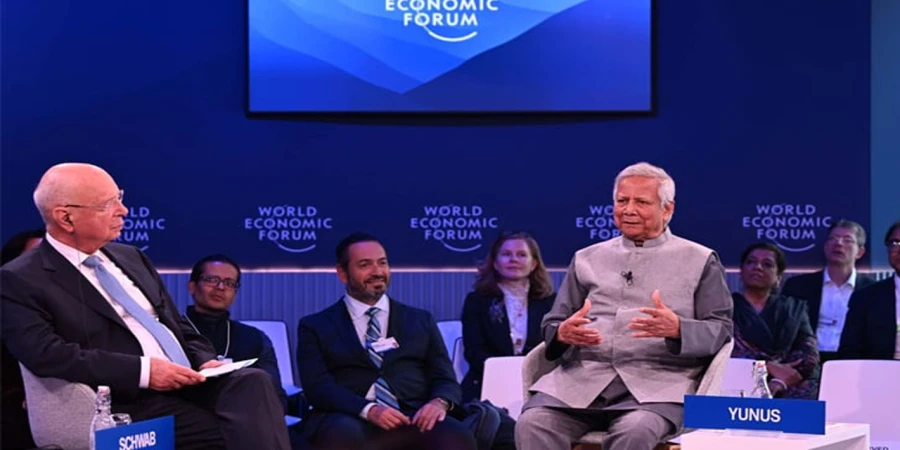
ছবি: Photo: Collected
repoter
Headline:

ছবি: Photo: Collected
During a meeting with Klaus Schwab, founder of the World Economic Forum (WEF), in Davos, Switzerland, on Thursday, Chief Advisor to the Interim Government, Dr. Muhammad Yunus, stated that elections might be postponed if the people demand long-term reforms.
Dr. Yunus explained, “If people want rapid reforms, we aim to hold elections by the end of this year. However, if they express a preference for more extensive, long-term reforms, it will require an additional six months.”
Addressing the nation’s electoral process, the Nobel Laureate lamented the lack of voting opportunities for new voters over the past 16 years, calling it a regrettable situation. He emphasized that while the government is prepared to organize elections, it is ultimately up to the citizens to decide the scope and nature of the reform process. The decision lies between opting for a shorter reform agenda or embracing a broader, long-term transformation.
Dr. Yunus outlined the reform agenda of the interim government, stressing that elections cannot be held without understanding the preferences of the people regarding the type of election they want. He underscored the importance of public consensus in shaping the electoral framework.
Reflecting on the context of last year’s student uprising, the Chief Advisor said that in July, students took to the streets of Dhaka to demand the elimination of discrimination in government recruitment. During their protests, they expressed their aspirations and dreams through graffiti on the city’s walls. Dr. Yunus referred to this as a significant moment, highlighting the immense potential of the current generation.
Describing the youth as the most powerful generation in human history, Dr. Yunus attributed their transformation to technological advancements. He emphasized that this generation has evolved beyond being merely young citizens of Bangladesh to becoming part of a global youth movement.
He added that this generation has no desire to return to the "old Bangladesh" and stressed the need to build a new and forward-looking Bangladesh.
To foster unity, Dr. Yunus announced the formation of a Consensus Commission. This commission aims to achieve agreement among all political parties and civil society organizations. The resulting “July Charter” will serve as a guiding document for the nation’s reform agenda.
Dr. Yunus also highlighted the government’s ongoing efforts to restore the economy. He reported progress in stabilizing foreign currency reserves and revitalizing the banking sector, indicating that positive changes were already underway.
repoter

0

0
BNP Accuses Government of Announcing Budget Without Public Consent
Eid Journey Expected to Be Smooth Despite Road Damage and Rain: Highway Police
Hamza and Fahmidul Make Debuts as Bangladesh Face Bhutan in International Friendly
Chief Advisor Yunus: Enforced Disappearances a Grim Reflection of Our Society
Israeli War Crimes in Gaza Undeniable, Says Former U.S. State Department Spokesperson Matthew Miller
Special Allowance Announced for Government Employees from July
Saudi Diplomatic Envoy Meets CAAB Chairman to Discuss Enhanced Aviation Cooperation
Jamuna River Water Level Rises Alarmingly in Tangail, Flood Fears Loom
Commerce Ministry Forms Election Board for FBCCI’s New Executive Committee
“We Inherited a Country on the Brink, Not Power”: Economic Adviser Defends Budget Amid Crises
Political Consensus Grows: Parties Resume Talks with National Consensus Commission
Bangladesh Return Home After Consecutive T20 Series Defeats
Chief Adviser Seeks to Bridge Gaps and Expand Consensus in July Charter
Government Proposes Hike in Old Age and Widow Allowances in Upcoming Budget
Government's Stance Contradicts Core Goals of Reform: TIB Slams Black Money Legalization Policy
No Justifiable Reason to Delay Election Beyond December: Salahuddin Ahmed
Election Commission Receives Court Order on Ishraque’s Oath as Dhaka South Mayor
Teesta Barrage Gates Opened as Water Levels Rise from Rain and Hill Runoff
For the First Time in History, National Budget to Be Announced from BTV Studio
Budget Presentation Rescheduled to 3 PM on Monday, Says Government
Bloomberg's 2024 List of Richest Families: The Walton Family Tops the Rankings
The Real Story Behind Tawhid Afridi’s Marriage
Dr. Muhammad Yunus Invited to World Governments Summit 2025 in Dubai
Experts Warn of Job Losses Amid 4th Industrial Revolution in Bangladesh
Journalist Abul Hossain Ripon Granted Bail
"Fulkumari" by Pinaki Bhattacharya Unveiled in Paris
Kazi Nazrul Islam Officially Declared Bangladesh’s National Poet
Starlink Secures License to Operate in Bangladesh
School Admission Applications Begin Today, No Quota for Freedom Fighters' Grandchildren
Calls to Remove Tulip Siddiq from UK Treasury Role Amid Corruption Allegations
Bangladesh's Export Earnings Rise by 17.72% in December 2024
July Revolution Proclamation Set to Address Legitimacy and Vision for a New Bangladesh
Bangladesh Scores 84th in Global Hunger Index 2024
BNP Committed to Free and Fair Elections, No Compromise: Tarique Rahman
Four Killed by Train in Patgram While Sitting on Railway Tracks
Bangladeshi Man Becomes Neymar's Close Friend and Trusted Associate
Government to Announce Up to 25% Dearness Allowance for Public Servants
Netanyahu Operates from Bunker Following Hezbollah Drone Attack
Dengue Claims 8 More Lives in 24 Hours, Total Death Toll Reaches 350
Yunus Urges UAE to Lift Visa Ban and Recruit More Bangladeshi Workers
